TUESDAY EDITORIAL
Inhumane and unconstitutional economic policy ‘takes food from the mouths of children’
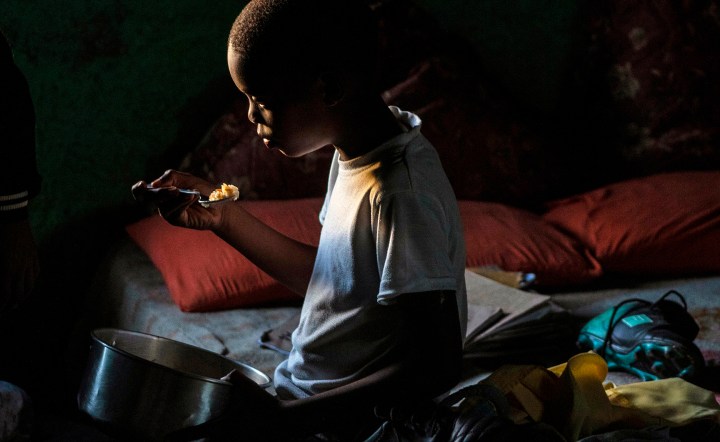
In several villages in the Eastern Cape there are reports of children running a food stokvel, a practice they have termed ‘Umgalelo’, to make sure that at least twice a week their school feeding scheme fills their little stomachs. Their hunger, and the indignity they suffer as children, is directly linked to cuts to social grants and the funding of basic education. It’s both inhumane and unconstitutional. The government should be ashamed.
In a village near Lusikisiki in the OR Tambo district of the Eastern Cape, groups of primary school children have created a food-sharing practice they call “Umgalelo”. Each day, one child exchanges the portion of food he or she has received from the National School Nutrition Programme (NSNP) with another, on the promise that the next day the other child will do the same in return. That way every second day each child eats a bigger, more filling portion.
And every other day the same child gets no food at school.
The sad logic – conjured up out of necessity by 10- to 12-year-olds – is that it’s more satisfying to eat a filling meal once every two days, than a completely insufficient amount every day.
The principal (who asked not to be named) told me the school receives only 10kg of food per day to feed its 300 learners. Not enough, yet she is still accused of “overfeeding the children”.
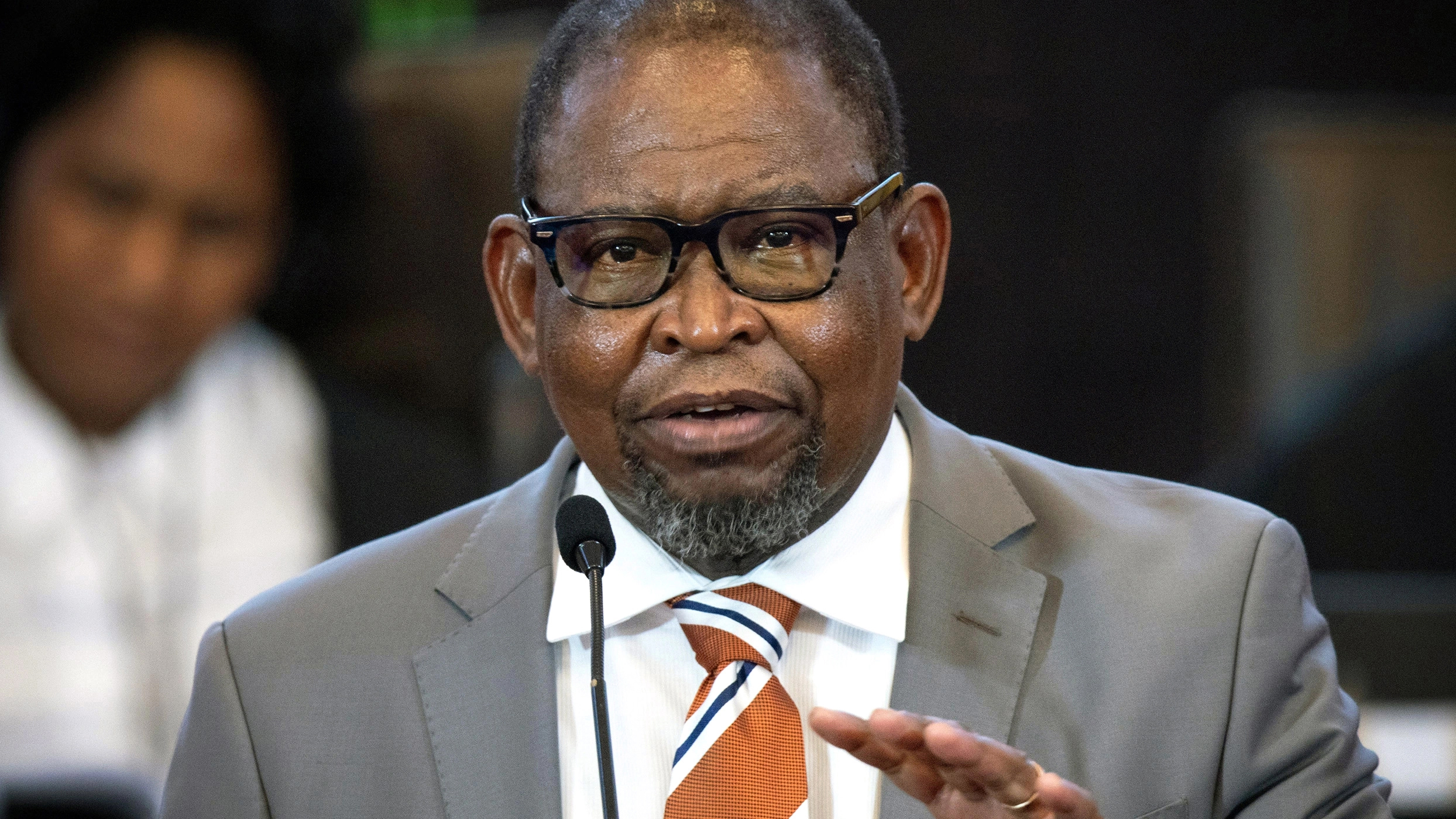
Finance Minister Enoch Godongwana delivers the Medium-Term Budget Policy Statement on 26 October 2022. (Photo: Leila Dougan)
She says this practice has been going on for several years and is more widespread than in just her school. Literally Umgalelo in Xhosa means “contribution” – a kind of stokvel for hungry children; figuratively, the principal tells me, it means “you give me today and then tomorrow I give you”.
This story was first relayed to me by a shocked health professional who visited the school recently, and then confirmed by the school’s principal. It puts a child’s face to the statistics provided by several NGOs and academic units that focus on children and children’s rights, in their response to last week’;s Medium Term Budget Policy Statement (MTBPS).
In the wake of the MTBPS the children’s rights activists complain about the fact that, once again, there has been no increase in the child support (CSG) and foster child grants, or the Social Relief of Distress (SRD) grant.
According to Kath Hall and Paula Proudlock, senior researchers at UCT’s Children’s Institute: “The CSG is the most pro-poor of all the permanent grants as well as being well targeted to the poorest women and children. Yet for the past two years it has received below-food inflation increases and an even lower increase of just 2% is planned for 2023.”
Read in Daily Maverick: “SA’s poorest and youngest pushed over the edge in a cruel trade-off”
Hall and Proudlock argue: “Below-inflation increases will mean that the real value of grants is eroded: poor people will be poorer and there will be less food on the table. This is a disaster for the 13 million children and the seven million caregivers (primarily women) who depend on grants to provide for them. It is an unthinkable trade-off: the budget literally takes food from the mouths of children.”
Looking at the MTBPS through children’s unfed bellies also makes plain both the meaning and meanness of Finance Minister Enoch Godongwana’s MTBPS to Parliament on 26 October that extending the SRD for another year involved “difficult trade-offs and reductions in spending elsewhere”. Treasury’s MTBPS (at p 41) repeats this, saying:
“given the cost of extending [the SRD], increases to other social grants in 2023/24 will be slightly below inflation and other social welfare priorities may remain unaddressed.”
This is a cruel calculus that spills easily from the lips of a well-paid and fed politician.
But it’s more than just mean and inhumane – it’s unconstitutional.
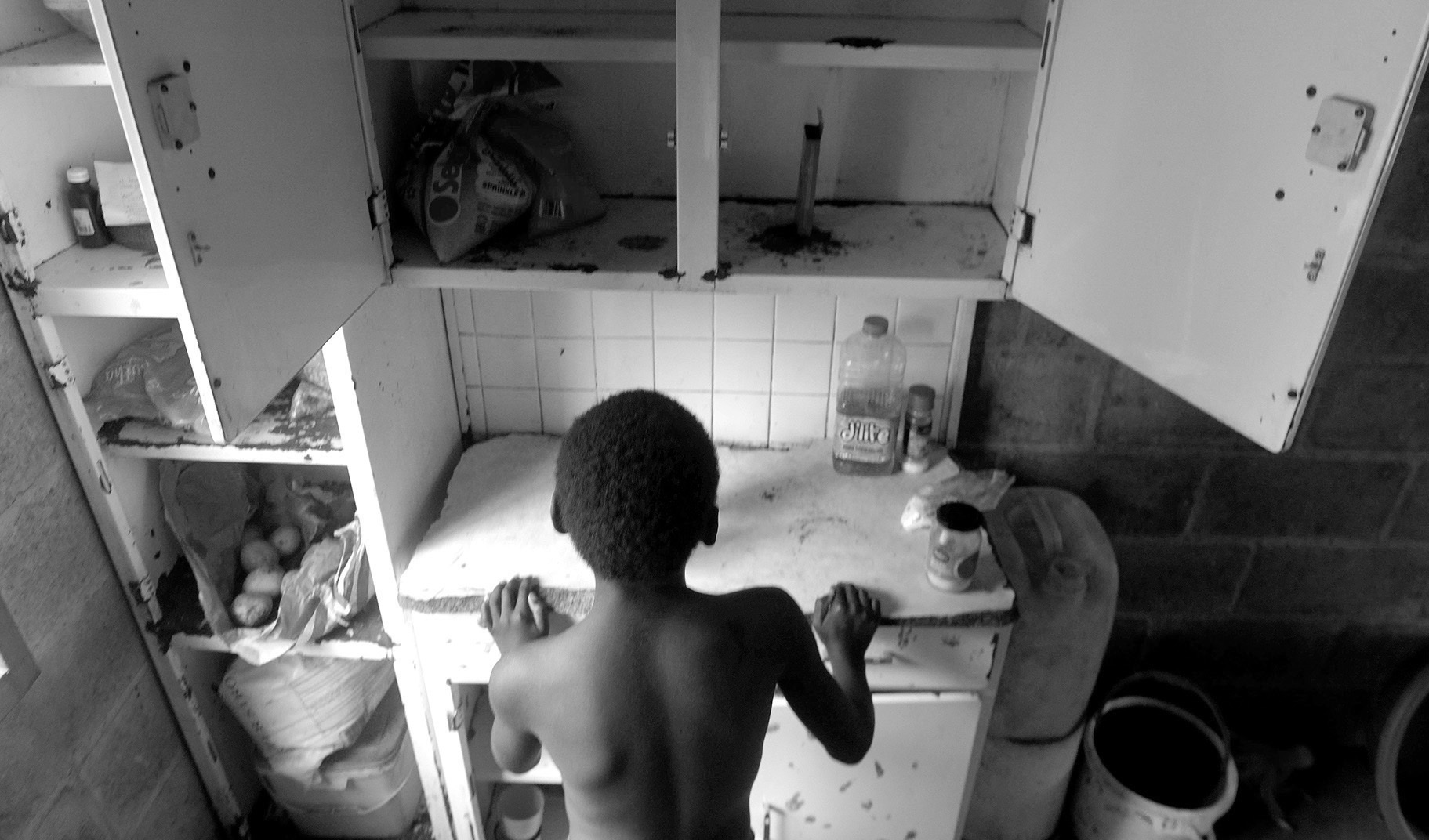
Warnings that South Africa’s levels of poverty and inequality will lead to a social explosion have been made many times and come from numerous bona fide sources, and especially from civil society organisations. (Photo: Black Star / Spotlight)
With this budget, and the spending priorities it omits or undervalues, South Africa is in effect defaulting on our Constitution, a Constitution that is meant to ensure:
- “Human dignity, the achievement of equality and the advancement of human rights and freedoms”; and
- Be the “supreme law” that in its Founding Provisions says to future governments “that law or conduct inconsistent with it is invalid, and the obligations imposed by it must be fulfilled”.
The MTBPS is inconsistent with the “best interests of the child” as well as a child’s right to basic education and basic nutrition. It is thus invalid.
But in addition we are also defaulting on a number international human rights treaties, including the UN Convention on the Rights of the Child, which South Africa has ratified since the end of apartheid.
According to the Budget Justice Coalition (BJC), a group of more than 20 leading social justice organisations, the MTBPS also undermines other fundamental rights. In a joint statement they point out that:
- “In the case of basic education, real spending per learner attending public schools has been declining sharply for a decade and will do so again this year and the next;
- “Funding for healthcare services is reduced by almost 10% in real per user terms in both 2022/23 and 2023/24; and
- While food price inflation reached 12% in September, the old-age pension and disability grant will be increased by only R10 this October, far below the cost-of-living price increases.”
Why would a government and political party that says it is pro-poor and pro-rule of law act in this way?
No one is underestimating the difficulty facing our government in trying to balance the budget in an environment where no country in the world runs a budget surplus, and where decades of under-taxation have created an existential problem for the democratic state and the constitutional contract. But we can expect better than making the weak suffer the most for the ANC’s sins of maladministration, corruption and State Capture.
They have other options that would shield the poor, including taxing the rich appropriately, eliminating all non-essential expenditure (including on politicians and ministers) and accelerating the struggle to stop corruption and recover its proceeds.

Families rely heavily on the school feeding scheme to fill their children’s tummies in Nelson Mandela Bay. (Photo: Deon Ferreira)
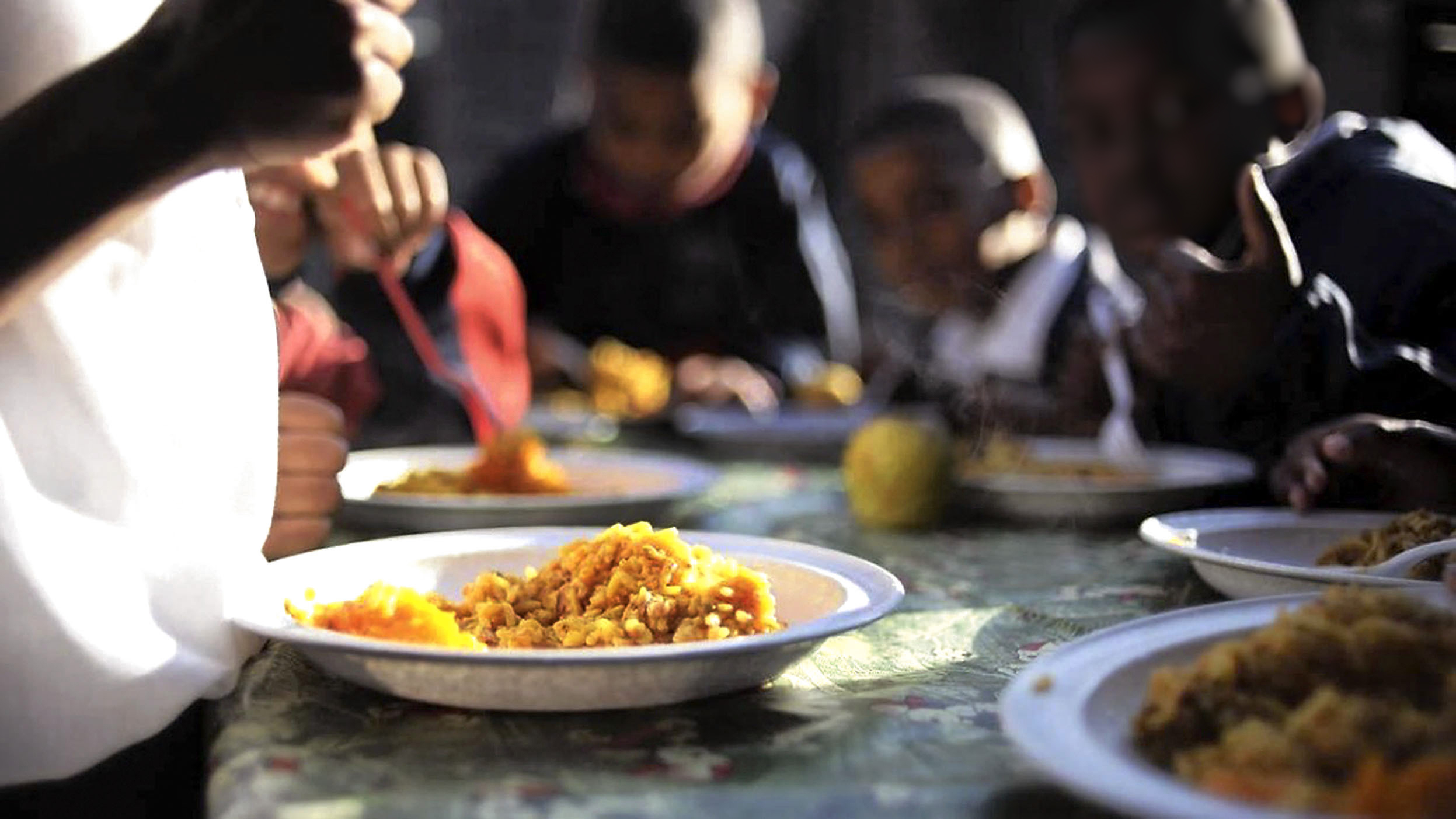
Eastern Cape groups of primary school children have a food-sharing practice they call ‘Umgalelo’. Each day, one exchanges the portions of food he or she has received from the National School Nutrition Programme with another, on the promise that the next day the other child will do the same in return. (Photo: African News Agency Archives / Wikipedia)
But truth be told it would seem that South Africa’s economic policy is being shaped more by fear of The Markets than rational economic thinking, social planning and an appreciation of binding constitutional obligations.
Indeed, the “trade-offs” made in the MTBPS seem to bear out an argument made in a recent article in the Big Idea that governments the world over have ceded control of economic policy to The Markets. Ironically, our government is behaving towards the poor in much the same way as Britain’s latest Tory government – except that the Tories are not bound by a Constitution that prescribes the parameters of permissible policy.
In a world that truly valued human rights and rule of law this type of policy would set alarm bells ringing and lead to a downgrade or greylisting. But we know ratings agencies don’t punish this type of unlawful behaviour. They are selective in what type of rule of law they value.
Discrimination against the poor
Coincidentally, Godongwana’s speech manifests what the UN Special Rapporteur on extreme poverty and human rights, Olivier De Schutter, described as “povertyism” in a speech he made last week at the UN General Assembly. De Schutter’s latest report on Banning discrimination on the grounds of socioeconomic disadvantage (here) finds that “povertyism has become firmly entrenched in public and private institutions, largely because decision-making positions tend to be held by those from higher-income backgrounds, skewing the system against people in poverty.”
Visit Daily Maverick’s home page for more news, analysis and investigations
He says: “Poverty will never be eradicated while povertyism is allowed to fester, restricting access to education, housing, employment and social benefits to those who need them the most.”
As I have argued too many times before (see here and here), this is a sure road to social fragmentation, more violence, authoritarianism and increasing costs. But it seems no one in Treasury is listening to the arguments and pleas made by those who are poor or who advocate on their behalf.
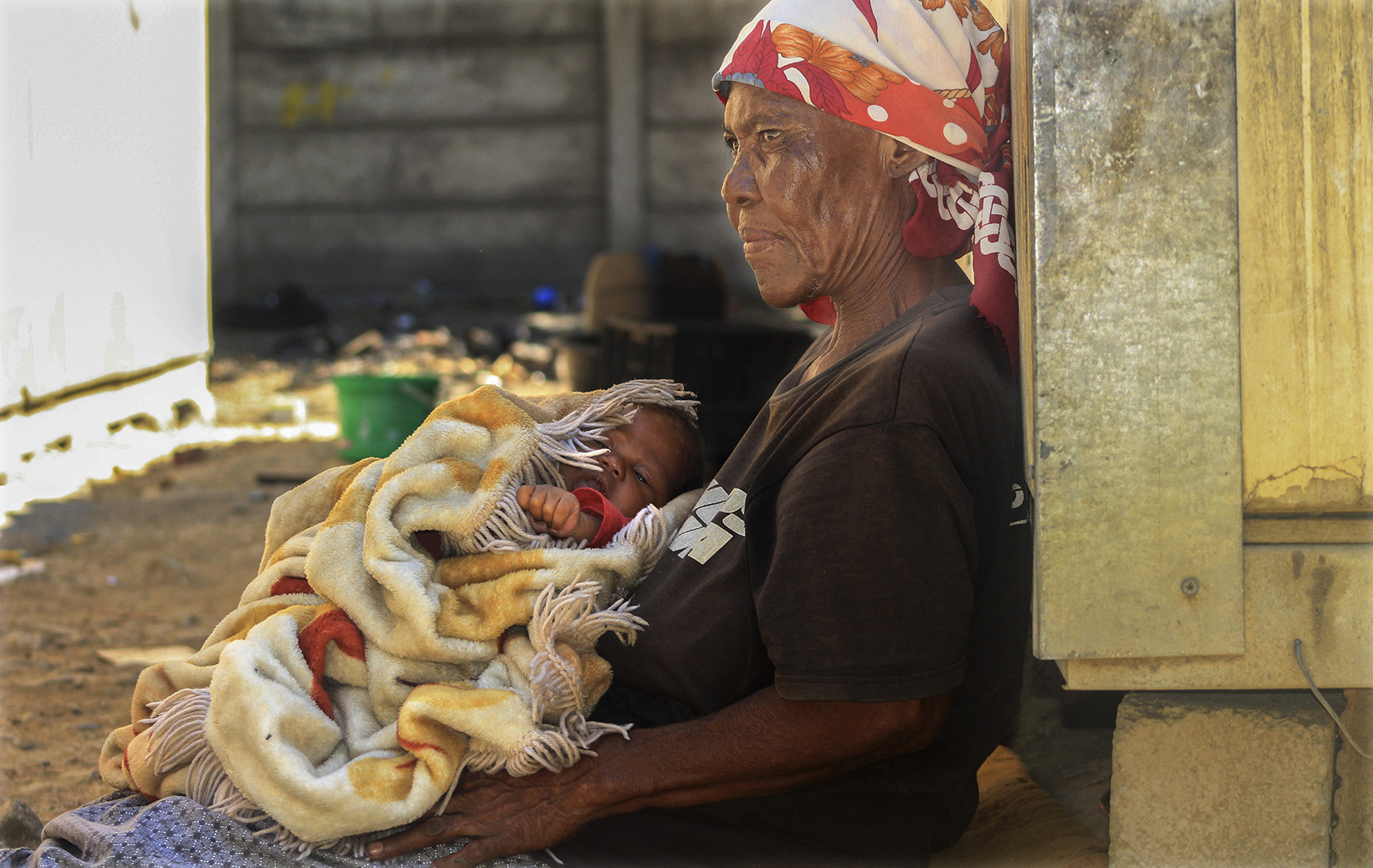
An elderly woman from the Soweto Informal Settlement in Mthatha, Eastern Cape, with her daughter’s son. Below-inflation increases will mean that the real value of grants is eroded: poor people will be poorer and there will be less food on the table. (Photo: Hoseya Jubase)
The question we must ask is whether poor people, the real victims of grand theft by a political party whose leaders are deeply complicit in State Capture, become an inconvenience, a burden. Are we punishing the weakest among us for the mismanagement and excesses of the rich and corrupt?
And, ultimately, must our children be beggars like Oliver Twist in Charles Dickens’s 1838 novel of the same name? “Please sir, I want some more?” asked Oliver, “desperate with hunger, and reckless with misery”.
To which one of the fat, healthy masters replied: “That boy will be hung.” DM/MC


















 Become an Insider
Become an Insider
Povertyism is a useful lens. It anticipates budget increases of well below inflation of life preserving grants for the most vulnerable, in favour of well above inflation increases for luxury enhancing salaries and benefits to government employees and politicians.
Truly a horrifying situation but less to do with this:
“But truth be told it would seem that South Africa’s economic policy is being shaped more by fear of The Markets than rational economic thinking, social planning and an appreciation of binding constitutional obligations. ”
And more to do with this:
“They have other options that would shield the poor, including taxing the rich appropriately, eliminating all non-essential expenditure (including on politicians and ministers) and accelerating the struggle to stop corruption and recover its proceeds. ”
Also, the country needs to dramatically reclassify what is considered “food waste”/”expired food” to ensure reasonably good food makes it to those who need it instead of being disposed of.
This story is incomplete without a response from the National School Feeding Scheme. As far as I know, food is allocated based on the number of registered learners. And the school is given cash not food. Other government schools in the same region don’t seem to have this problem. So I suspect there’s a particular problem in this case.
It’s also worth noting that 150 kids getting 10 kg rice or pap is about 70g per child which is actually the recommended quantity for a child of that age. There should be soya soup and veg in addition to that – that’s the standard government school menu.
Either way, before one uses an anecdote to be emblematic of a country’s problems it would be good to get the comments of nutritional experts in this field. SA has one of the most advanced school feeding schemes with a large number of NGOs, academics and government experts who could have given much more depth to this claim.
A decent education and birth control would solve a lot of these problems….children born to disfunctional family units where there is no father contributing, a mother trying to earn something and grandmothers ( at best) caring for these children and a state subsidy where the taxpayers money is stolen before it gets to where it is needed most all exacerbate the problem!
Correction, I see that it says 300 kids. That would indicate a problem in the allocation. The Education Department has a standard formula and as far as I know, one 10 kg bag of staple would not be correct for that number of learners.
In my opinion the food value reaching the children is significantly less than that initially allocated? Its called “fatcat erosion”, which must be eliminated?
You cannot read this and not react to it, unless of course you do not have a heart and you are only operating on pure cold logic. Well, if we do apply logic only to the situation you cannot but think that there is another solution. My appeal today is to the community at large. I know that there needs to be more in terms of grants, but the grant as such is a temporary solution. That of course is a subject for another discussion. My appeal is that we reach out. I am sure we could double or triple the provision at a single school as a small group of supporters for a particular project like the story of the school I read about here. How do we reach out? How do we get to know about all the challenges like these? How do we also check that the required help is delivered at the right place?
A great reply to such a complex problem overshadowed by the ANC’s inability to improve SA for all and stem their thieving while pretending to be our saviours. Get the message to the electorate to rid us from these corrupt Liberators BEFORE the majority are all illiterate and brain dead and we all consider SA a failed country.
The problem is that the money is there and the people who do the feeding are not properly monitored by the department and there is a whole slew of corruption around the feeding schemes. You have heartless people running these with government officials resulting in this situation and one speaks to what one has witnessed and other stories as I related a similar story. Queenstown, had a media story around this corruption and officials are involved even in paying for non -existent feeding schemes. There are a number of such cases in the Eastern Cape that end in prosecutors offices and perpetrators walking free. It is a heart wrenching situation. Money is allocated but it disappears.
So so sad. “They” don’t give a fuck
Taking no prisoners ,Mark . Putrid ,abominable fat cat detritus v so much good work done in private sector .
And yet we read today that the govt wishes to “invest” R170bn in coal plants that it seems can’t be fixed. Not that it is necessarily either/or but investing in the future generations with food and education vs investing in fossilized fossil fuel plants. Hmmm…
The issues that Mark is raising are very concerning but the problem lies in his diagnosis of the source of the problem. The source of the problem he raises is the budget and raises the issue of under – taxation but does not point who is being undertaxed because he also fails to put the question of broadening the tax base through investments in the real economy. He fails to address the question of economic growth and structural mpediments to investments as no investor owes South Africa investments. Investors do invest for charity but do so for a return on investments and when you put many things around which they must do they take their money elsewhere. Also, it is important to compare taxation with other countries because that is important at both corporate and individual levels. At corporate level companies will go to where tacxation is competitive and individuals with skills if you impose a heavy tax burden will leave your country or your country will bleed skills and be left with plumbers only! The issue of corruption around feeding scheme tenders is very rife in the Eastern Cape and other parts of the country and is part of the ruling party strategy of catching votes and funding of elections. One would be interested in his suggestions to create econmic activity in these areas including support for subsistence agriculture so that his solutions must no be anchored on the budget but also on question of economic development.